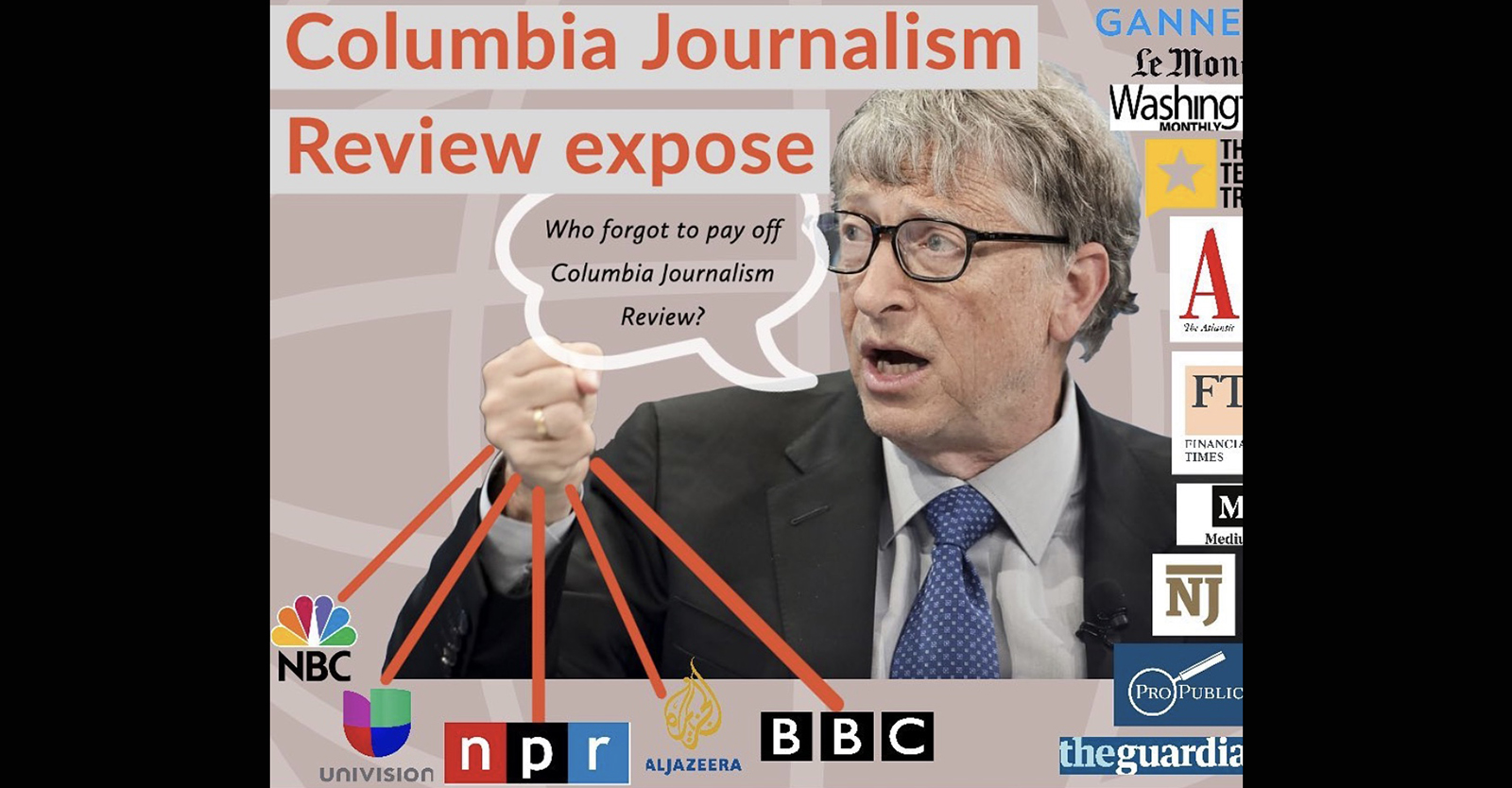By
Kudos to the Columbia Journalism Review for putting the muscle behind having Tim Schwab perform an in-depth investigation into how the Gates Foundation has lavished money on various not-for-profit news organizations, like NPR, as well as other media outlets in the US and abroad, to secure favorable, even at times one-sided coverage of its pet initiatives. Another successful leg of the Gates Foundations’ efforts is donating to fact-checkers, which in turn incorrectly brand articles that question Gates Foundation influence-buying or specific programs as inaccurate or conspiracy theories.
AD

Needless to say, this piece is particularly welcome given that Bill Gates is getting undue attention in the press for his views on Covid programs, particularly vaccines, as if medical policy patronage has rendered a software squillionaire particularly qualified to discuss public health. In fact, as Schwab points out:
During the pandemic, news outlets have widely looked to Bill Gates as a public health expert on covid—even though Gates has no medical training and is not a public official. PolitiFact and USA Today (run by the Poynter Institute and Gannett, respectively—both of which have received funds from the Gates Foundation) have even used their fact-checking platforms to defend Gates from “false conspiracy theories” and “misinformation,” like the idea that the foundation has financial investments in companies developing covid vaccines and therapies. In fact, the foundation’s website and most recent tax forms clearly show investments in such companies, including Gilead and CureVac.
Writing in De Correspondent, freelance journalists Robert Fortner and Alex Park examined the limitations and inadvertent consequences of the Gates Foundation’s relentless efforts to eradicate polio. In HuffPost, the two journalists showed how Gates’s outsize funding of global health initiatives has steered the world’s aid agenda toward the foundation’s own goals (like polio eradication) and away from issues such as emergency preparedness to respond to disease outbreaks, like the Ebola crisis. (This narrative has been lost in the current covid-19 news cycle, as outlets from the LA Times to PBS to STAT have portrayed Gates as a visionary leader on pandemics.)
I strongly urge you to read Schwab’s devastating account in full. Let me present part of three threads to entice you. The first is on how Gates giving has turned NPR into a foundation mouthpiece
Last August, NPR profiled a Harvard-led to help low-income families find housing in wealthier neighborhoods, giving their children access to better schools and an opportunity to “break the cycle of poverty.” According to researchers cited in the article, these children could see $183,000 greater earnings over their lifetimes—a striking forecast for a housing program still in its experimental staIf you squint as you read the story, you’ll notice that every quoted expert is connected to the Bill & Melinda Gates Foundation, which helps fund the project. And if you’re really paying attention, you’ll also see the editor’s note at the end of the story, which reveals that NPR itself receives funding from Gates.
NPR’s funding from Gates “was not a factor in why or how we did the story,” reporter Pam Fessler says, adding that her reporting went beyond the voices quoted in her article. The story, nevertheless, is one of hundreds NPR has reported about the Gates Foundation or the work it funds, including myriad favorable pieces written from the perspective of Gates or its grantees…
Since 2000, the Gates Foundation has given NPR $17.5 million through ten charitable grants—all of them earmarked for coverage of global health and education, specific issues on which Gates works.
NPR covers the Gates Foundation extensively. By the end of 2019, a spokesperson said, NPR had mentioned the foundation more than 560 times in its reporting, including 95 times on Goats and Soda, the outlet’s “global health and development blog,” which Gates helps fund. “Funding from corporate sponsors and philanthropic donors is separate from the editorial decision-making process in NPR’s newsroom,” the spokesperson noted…
Given Gates’s large funding role at NPR, one could imagine editors insisting that reporters seek out financially independent voices or include sources who can offer critical perspectives. (Many NPR stories on Gates don’t: here, here, here, here, here,here.) Likewise, NPR could seek a measure of independence from Gates by rejecting donations that are earmarked for reporting on Gates’s favored topics.
Mind you, there’s more in this vein.
One initiative that I found particularly alarming was the Gates Foundation throwing its weight behind “solutions journalism”:
If critical reporting about the Gates Foundation is rare, it is largely beside the point in “solutions journalism,” a new-ish brand of reporting that focuses on solutions to problems, not just the problems themselves.
While that might sound anodyne, first, focusing on “solutions” provided a ready platform for billionaires to advance their ideas for how to remake society. Second, it also appears designed to pre-empt or at least weaken efforts to have government intervene, either via social programs or law against damaging conduct. Fundamental social change is usually driven by grievances. The press often plays an important role by showing those injustices to be common. That legitimates the sense of harm felt by the victims, which encourages them to take action, and also helps them win support form other groups. By contrast, “solutions” come from…..software developers….and incrementalists like NGOs.
In fact, “solutions journalism” is awfully reminiscent of the highly successful campaign to remake jurisprudence along neoliberal lines. From ECONNED:
The third avenue for promoting and institutionalizing the “free market” ideology was inculcating judges. It was one of the most far-reaching actions the radical right wing could take. Precedents are powerful, and the bench turns over slowly. Success here would make the “free markets” revolution difficult to reverse…
It is hard to overstate the change this campaign produced, namely, a major
shift in jurisprudence. As Steven Teles of the University of Maryland noted:
In the beginning, the law and economics (with the partial exception of its application to antitrust) was so far out of the legal academic mainstream as to be reasonably characterized as “off the wall.” . . . Moving law and economics’ status from “off the wall” to “controversial but respectable” required a combination of celebrity and organizational entrepreneurship. . . . [Henry] Mannes’ programs for federal judges helped erase law and economics’ stigma, since if judges— the symbol of legal professional respectability—took the ideas seriously, they could not be crazy and irresponsible.62
Now why was law and economics vantage seen as “off the wall?” Previously, as noted above, economic thinking had been limited to antitrust, which inherently involves economic concepts (various ways to measure the power of large companies in a market). So extending economic concepts further was at least novel, and novel could be tantamount to “off the wall” in some circles. But with hindsight, equally strong words like “radical,” “activist,” and “revolutionary” would app
lWhy? The law and economics promoters sought to colonize legal minds. And, to a large extent they succeeded. For centuries (literally), jurisprudence had been a multifaceted subject aimed at ordering human affairs. The law and economics advocates wanted none of that. They wanted their narrow construct to play as prominent a role as possible.
For instance, a notion that predates the legal practice is equity, that is, fairness. The law in its various forms including legislative, constitutional, private (i.e., contract), judicial, and administrative, is supposed to operate within broad, inherited concepts of equity. Another fundamental premise is the importance of “due process,” meaning adherence to procedures set by the state. By contrast, the “free markets” ideology focuses on efficiency and seeks aggressively to minimize the role of government. The two sets of assumptions are diametrically opposed.
Now why is it reasonable to be concerned that “solutions journalism” could lead to the already pretty captured journalism profession to become even more friendly to powerful interests?
The premise of traditional “fair and balanced” reporting is that there are two sides to a story. Someone is accused of a crime. A reporter is expected to seek out the defendant for comment. Similarly, a business or government tries to promote a new program. In the World According to Journalism School, the press is supposed to do more than just run the press release; they should contact parties that would be affected by it and see if any will comment.
By contrast, “solutions journalism,” at least as practiced by the Gates Foundation, looks like an avenue for influence peddling. From Schwab:
That more upbeat orientation has drawn the patronage of the Gates Foundation, which directed $6.3 million to the Solutions Journalism Network (SJN) to train journalists and fund reporting projects. Gates is the largest donor to SJN—supplying around one-fifth of the organization’s lifetime funding. SJN says more than half of this money has been distributed as subgrants…
SJN acknowledges on its website “that there are potential conflicts of interest inherent” in taking philanthropic funding to produce solutions journalism, which SJN cofounder David Bornstein elaborated on in an interview….Asked if he could provide examples of any critical reporting about Gates emerging from SJN, Bornstein took issue with the question. “Most of the stories that we fund are stories that look at efforts to solve problems, so they tend to be not as critical as traditional journalism,” he said.
That is also the case for the journalism Bornstein and fellow SJN cofounder Tina Rosenberg produce for the New York Times. As contract writers for the “Fixes” opinion column, the two have favorably profiled Gates-funded education, agriculture, and global health programs over the years—without disclosing that they work for an organization that receives millions of dollars from Gates. Twice in 2019, for example, Rosenberg’s columns exalted the World Mosquito Project, whose sponsor page lands on a picture of Bill Gates…
My cursory review of the Fixes column turned up fifteen installments where the writers explicitly mention Bill and Melinda Gates, their foundation, or Gates-funded organizations. Bornstein and Rosenberg said they asked their editors at the Times to belatedly add financial disclosures to several of these columns, but they also cited six they thought did not need disclosure. Rosenberg’s 2016 profile of Bridge International Academies, for example, notes that Bill Gates personally helps fund the project. The writers argue that SJN’s ties are to the Gates Foundation, not to Bill Gates himself, so no disclosure is needed.
I’ve already quoted a bit too liberally from this important article, so please delay no further and read it in full, since it covers other important topics, like the subversion of fact-checkers. But even with Schwab’s digging, there’s even more that the Gates Foundation does to influence the press, such as entering into contracts, which remains almost entirely hidden.
Source: Naked Capitalism
——————————————————————————————————————————————————————————
Statements, comments or opinions published in this column are of those of the author(s) and do not necessarily reflect the editorial policy of Warsan magazine. Warsan reserves the right to moderate, publish or delete a post without prior consultation with the author(s). To publish your article or your advertisement contact our editorial team at: warsan54@gmail.com

